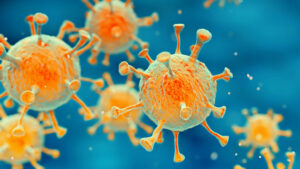A scientific research paper published in the World Journal of Men’s Health observed the difference in tissue composition between men who had contracted the disease and men who had not.

Coronavirus can cause damage to blood vessels, which in turn can damage parts of the body the vessels supply, including the sponge-like tissue in the penis.
Ranjith Ramasamy, associate professor and director of the University of Miami Miller School of Medicine’s reproductive urology programme, led the study.
He said that erectile dysfunction “could be an adverse effect of the virus”.
The Covid virus (indicated by the blue arrows) is seen in tissue inside the penis. Scientists zoomed in to 10 nanometers – or 0.000001 of a centimetre – to spot it and said its presence may raise the risk of erectile dysfunction
The study focused on four men who were having penile prosthesis surgery for erectile dysfunction.
Two had suffered with COVID-19, and two had not. They were all aged between 65 and 71.
The pair who had the coronavirus were infected six and eight months before the observations, with one hospitalised for the virus and the other not. Neither had a history of erectile dysfunction.
Remnants of the virus were observed in the penis tissue of the two COVID-positive men.
The damage coronavirus causes to blood vessels is known as endothelial dysfunction.
Read Also: FG Issues Travel Advisory To Nigerians
The virus was also spotted in a separate patient. Miami University scientists checked samples from two men with erectile dysfunction who had had Covid for the virus
“In our pilot study, we found that men who previously did not complain of ED [erectile dysfunction] developed pretty severe ED after the onset of COVID-19 infection,” Dr Ramasamy said.
He added: “Our research shows that COVID-19 can cause widespread endothelial dysfunction in organ systems beyond the lungs and kidneys.
“The underlying endothelial dysfunction that happens because of COVID-19 can enter the endothelial cells and affect many organs, including the penis.”
Eliyahu Kresch, a medical student working with Dr Ramasamy, said: “These latest findings are yet another reason that we should all do our best to avoid COVID-19.”
The paper suggested: “For now, history of COVID-19 should be included in the work-up of ED and positive findings should be investigated accordingly.
“Patients should be aware of the potential complication of post-COVID-19 ED.
“Any changes observed in ED after infection should be followed up with the appropriate specialist for treatment and to help further investigation into the condition.
“Future studies are needed to validate the effects of this virus on sexual function.”















Discussion about this post